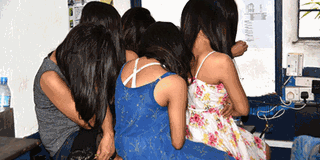Report: Sex trafficking still prevalent in Kenya

Nepalese women arrested during a raid at Nyali Police Station in Mombasa, last year. They were allegedly part of an international human trafficking syndicate. Young girls are now more likely to fall into this trap. PHOTO | FILE | NATION MEDIA GROUP
What you need to know:
- National Crime Research Centre report indicates that labour and sex are the most prevalent forms of human trafficking.
- Labour and Social Protection CS Mr Simon Chelugui said those trafficked are mostly subjected to sexual exploitation, slavery, forced labour, forced marriage, begging and removal of organs.
- The Covid-19 pandemic has led to an increase in child trafficking and labour, rape and defilement.
The most prevalent forms of human trafficking in Kenya are labour and sex related, a recent report by the National Crime Research Centre (NCRC) indicates.
According to the report, sex trafficking stands at 53 per cent with labour at 44 per cent with the most affected being women (41%), children (33%) and men (26%).
Kenyans are mostly recruited by legal or illegal employment agencies or voluntarily migrate to Europe, the United States, Southeast Asia, and the Middle East particularly Saudi Arabia, Lebanon, Kuwait, Qatar, the UAE, and Oman.
The report states that they migrate to these countries in search of employment, where they are exploited in domestic servitude, massage parlors and brothels, or forced manual labour.
In August, the government released gloomy statistics showing the illegal trade is still rampant in the country despite efforts to contain it. The statistics indicate out of those trafficked in and out of Kenya, 49 and 23 per cent of them are normally women and girls respectively.
Breeding ground
Labour and Social protection CS Mr Simon Chelugui in August said those trafficked from and into Kenya are mostly subjected to sexual exploitation, slavery, forced labour, forced marriage, begging and removal of organs.
The CS singled out forced labour and sexual exploitation as being rampant in Kenya adding that high job losses perpetuated by Covid-19 pandemic has offered a fertile breeding ground for human traffickers who are promising thousands of innocent and desperate Kenyans non-existence jobs abroad.
Cases of young girls and women who have been forced into commercial sex, prostitution and labour in the Middle East countries calling for help back home have been rife in recent years.
It is due to such glaring statistics on Sexual Exploitation of Children, and Counter Trafficking in Persons, more so young girls and women, that the Coalition on Violence against Women (COVAW) organised a workshop bringing together various stakeholders in a bid to look for a lasting solution to the menace.
Among the participants in the workshop held in a Nairobi hotel recently included MPs, the Kenya Parliamentary Caucus on Sustainable Development Goals and Business and Civil Society Organisation (CSOs).
COVAW Executive Director Ms Wairimu Munyinyi-Wahome said the uptake of the National Plan of Action on Child and Human Trafficking and Sexual Exploitation of children, Girls and Women in Kenya is key to dealing with the menace.
She added that there is need to change the strategy on girls and children trafficking for sexual exploitation since the one in place is currently not working.
Influence budgeting
Ms Munyinyi-Wahome noted that with the Covid-19 pandemic, protection issues touching on children among them child trafficking and labour, rape and defilement have been on the increase.
“It is important that related plans of actions are activated and implemented. There is also the need for mobilising more budgetary allocation for sustainability.
She added that for consistency of mitigation and response to child exploitation, the sustainability of resourcing require to be vested within, with both the National and county governments and CSOs being partners.
She revealed her organisation has embarked on a campaign dubbed Wape Kimbilio which seeks to establish safe houses for children, young girls and women who need to be protected from Gender-Based Violence and threats of human trafficking.
The Chairman of the Kenya Parliamentary Caucus on SDGs and Business Mr Gideon Ochanda said there is need to look into why interventions aimed at ending the menace have not been working.
Mr Ochanda, who is also the Bondo MP, advised the stakeholders working in the Trafficking in Persons sector to influence the budgeting making process by being there when it starts in order to secure the desired funding.
The MP said government is generally traditional when it comes to budget-making and therefore rare to bring in new items in the budgeting.
“As stakeholders you must be ready to influence the budget-making process,” he said.
Kisii Woman Representative Janet Ongera observed that there is need to come up with legislations that protect the fight against human trafficking and GBV.
Transit point
US State Department in its 2020 Trafficking in Persons Report noted that Kenya remains a source, transit point and destination for people subjected to sex trafficking and forced labour.
The report observed that the Kenyan government does not fully meet the minimum standards for the elimination of trafficking but is making significant efforts to do so.
“The government demonstrated overall increasing efforts compared to the previous reporting period; therefore Kenya remained on Tier 2,” the report says in part.
The department, however, noted that the government has maintained uneven law enforcement efforts.
The Counter-Trafficking in Persons Act of 2010 criminalised sex trafficking and labour trafficking and prescribed penalties of 30 years’ to life imprisonment, a fine of not less than Sh30 million or both.
These penalties, the US State Department notes, are sufficiently stringent but observes that by allowing for a fine in lieu of imprisonment for sex trafficking, these penalties were not commensurate with those for other serious crimes, such as rape.





